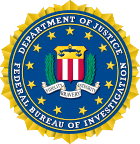FBI Criminal Investigative Division
| Federal Bureau of Investigation | |
|---|---|
 | |
 Badge of the Federal Bureau of Investigation | |
 | |
| Common name | Federal Bureau of Investigation |
| Abbreviation | FBI |
| Motto | Fidelity, Bravery, Integrity |
| Agency overview | |
| Formed | July 26, 1908 |
| Employees | 35,104[1] (October 31, 2014) |
| Annual budget | US$8.3 billion (FY 2014)[1] |
| Jurisdictional structure | |
| Federal agency (Operations jurisdiction) | United States |
| Operations jurisdiction | United States |
| Legal jurisdiction | As per operations jurisdiction |
| Governing body | U.S. Department of Justice |
| Constituting instrument | |
| General nature | |
| Operational structure | |
| Headquarters | J. Edgar Hoover Building Northwest, Washington, D.C. |
| Sworn members | 13,260 (October 31, 2014)[1] |
| Unsworn members | 18,306 (October 31, 2014)[1] |
| Agency executives |
|
| Child agencies | |
| Major units | 5
|
| Field offices | 56 (List of FBI Field Offices) |
| Notables | |
| People |
|
| Programs | |
| Significant Operations | |
| Website | |
| www | |
The Criminal Investigative Division (CID) is a division within the Criminal, Cyber, Response, and Services Branch of the Federal Bureau of Investigation. The CID is the primary component within the FBI responsible for overseeing FBI investigations of traditional crimes such as narcotics trafficking and violent crime.
The CID is the FBI’s largest operational division, with 4,800 field special agents, 300 intelligence analysts, and 520 Headquarters employees. Following the September 11 terror attacks, the CID was dramatically restructured with a significant portion of its resources being diverted into the new FBI National Security Branch.
Leadership
Headed by an FBI Assistant Director, the CID is responsible to the Executive Assistant Director of the FBI Criminal, Cyber, Response, and Services Branch.
The current CID Assistant Director is Kevin L. Perkins, who is also the Acting Executive Assistant Director of CCRSB, who has served in that position since April 17, 2007.[2]
Organization
The CID's organizational structure was reorganized during FY 2004 by FBI leadership in an effort to better reflect current trends in criminal activity.
- National Crimes Branch
- Integrity in Government/Civil Rights Section
- Financial Crimes Section
- Operational Support Section
- Violent Crimes Section
- Criminal Enterprise Branch
- Americas Criminal Enterprise Section – addresses drugs, gangs, and major thefts
- Transnational Criminal Enterprise Section – investigate organized crime matters
References
- ^ a b c d "Frequently Asked Questions". Federal Bureau of Investigation. Retrieved 2016-09-02.
- ^ Kevin L. Perkins - Assistant Director, Criminal Investigative Division, FBI National Press Office, 2011-04-17
External links

